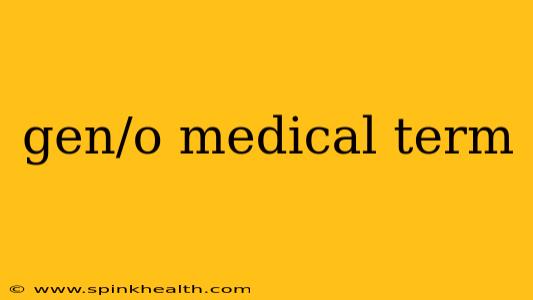Decoding the Medical Term "Gen/o": A Journey into Genetics
The seemingly simple term "gen/o" holds a world of meaning within the vast landscape of medical terminology. It's not just a random string of letters; it's the cornerstone of understanding genetics and inherited traits. Let's embark on a journey to unravel its significance and explore its related medical contexts.
Imagine a detective story, where the clues are hidden within our very DNA. "Gen/o," derived from the Greek word "genos" meaning "race" or "kind," acts as our primary key in this intricate investigation. It signifies the origin, development, or production of genes – the fundamental units of heredity. Understanding "gen/o" is crucial for deciphering countless medical terms and comprehending the complexities of genetic diseases, inherited conditions, and even personalized medicine.
What does gen/o mean in medical terms?
In the medical field, "gen/o" specifically refers to genes and their related processes. This means it's not just about the genes themselves, but also the actions and interactions related to genetic material. This includes things like gene expression, genetic mutations, and the inheritance patterns of specific traits. Think of it as the entire narrative of how genes impact an individual's health.
What are some common medical terms using the root "gen/o"?
Numerous medical terms incorporate "gen/o" to define various aspects of genetics and related conditions. Here are a few examples:
- Genotype: This refers to the genetic makeup of an organism, the specific combination of genes an individual inherits from their parents. It's the underlying blueprint that determines many of their characteristics.
- Genome: This is the complete set of genetic instructions in an organism, encompassing all its genes and other genetic material. Mapping the human genome has been a monumental achievement in medical science.
- Genetic: This is an adjective widely used to describe anything related to genes, heredity, or inheritance. For example, a "genetic disorder" indicates a health problem caused by a mutation or alteration in a gene.
- Genomics: This is the branch of biology focused on the structure, function, evolution, and mapping of genomes. Genomics plays a crucial role in understanding diseases at a molecular level.
- Pathogenic: While not directly using "gen/o," many pathogenic conditions arise from gene mutations. Therefore, understanding "gen/o" is fundamental to comprehending the basis of many diseases.
What are some genetic disorders?
Many debilitating and life-threatening diseases stem from genetic mutations or abnormalities. Some prominent examples include:
- Cystic Fibrosis: A genetic disorder affecting the lungs and digestive system.
- Sickle Cell Anemia: A blood disorder leading to abnormally shaped red blood cells.
- Hemophilia: A group of inherited bleeding disorders.
- Huntington's Disease: A neurodegenerative disorder.
- Down Syndrome: A genetic disorder resulting from an extra chromosome.
How is understanding "gen/o" important for medical diagnosis and treatment?
Comprehending the meaning and implications of "gen/o" is fundamental for accurate diagnosis and treatment in modern medicine. Genetic testing, for instance, allows clinicians to identify specific genetic mutations that cause or contribute to diseases. This information can significantly influence treatment strategies, leading to personalized approaches designed to address the underlying genetic factors.
Conclusion
"Gen/o" is far more than just a medical prefix; it's a gateway to understanding the intricate world of genetics, inheritance, and the complex interplay of genes in health and disease. As genetic research continues to advance at an unprecedented rate, a thorough comprehension of this fundamental term becomes increasingly vital for both healthcare professionals and the general public alike. The story of "gen/o" is far from over; it's an ongoing narrative that continues to shape the future of medicine.

